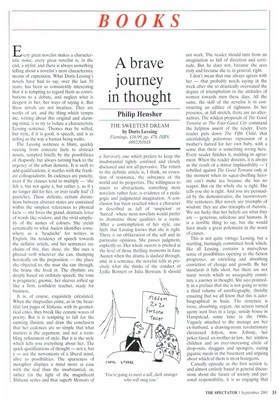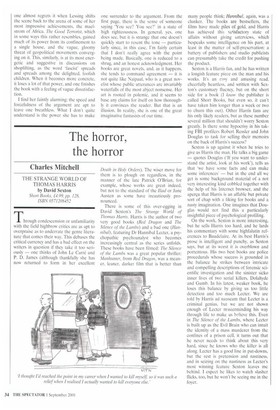A brave journey in thought
Philip Hensher
THE SWEETEST DREAM by Doris Lessing Flamingo, £16.99, pp, 478, ISBN 0002261618 Every great novelist makes a characteristic noise; every great novelist is, in the end, a stylist; and there is always something telling about a novelist's most characteristic means of expression. What Doris Lessing's novels have had to say, over the last 50 years, has been so consistently interesting that it is tempting to regard them as contributions to a debate, and neglect what is deepest in her, her ways of saying it. But these novels are not treatises. They are works of art, and the thing which tempts me, writing about this original and alarming mind, is to try to isolate a characteristic Lessing sentence. Themes may be willed, but style, if it is good, is speech, and is as telling as the way a human being walks.
The Lessing sentence is blunt, quickly veering from concrete facts to abstract nouns, tempted briefly by the possibilities of rhapsody, but always turning back to the urgency of the urban demotic. It is swift to add qualifications, it startles with the frankest colloquialisms. Its cadences are punchy, even if the clauses tend to multiply — 'she felt x, but not quite x, but rather y, as if y no longer did for her, or ever really had' (I pastiche). These delicate, certain distinctions between abstract states are contained within the simplest references to physical facts — she loves the grand, dramatic force of words like wisdom, and the vivid simplicity of the names of colours. She yields ecstatically to what Auden identifies somewhere as a 'headache' for writers in English, the tendency of speech towards the definite article, and her sentences are chains of this, that, those, the. She uses a phrasal verb wherever she can, thumping heroically on the preposition — the place she objected to, the man she saw through, the house she lived in. The rhythms are deeply based on ordinary speech; the tone is pragmatic, gnomic, her sleeves rolled up like a firm, confident teacher, ready for business.
It is, of course, exquisitely calculated. When the rhapsodies come, as in the beautiful last pages of Shikasta, with its geometrical cities, they break like ecstatic waves of poetry. But it is tempting to fall for the cunning illusion, and draw the conclusion that her cadences are so simple that what matters is the argument, and not a trembling refinement of style. But it is the style which tells you everything about her. The quick qualifications of thought — not x, but y — are the movements of a liberal mind, alive to possibilities. The sparseness of metaphor displays a mind more at ease with the real than the insubstantial, or, rather (in the light of the magnificent Shikasta series and that superb Memoirs of a Survivor), one which prefers to keep the insubstantial tightly confined and closely discussed and not all-pervasive. The return to the definite article is, I think, an evocation of resistance, the substance of the world and its properties. The willingness to resort to abstractions, something most novelists rather fear, is evidence of a pedagogic and judgmental imagination. A conclusion has been reached when a character is described as full of 'suspicion' or 'hatred', where most novelists would prefer to dramatise these qualities in a scene. After a contemplation of her style, one feels that Lessing knows that she is right. There is no obliteration of the self and its particular opinions. She passes judgment, explicitly so. Her whole oeuvre is pitched at the level of those thrilling moments in Jane Austen when the drama is slashed through, and, in a sentence, the novelist tells us precisely what she thinks of the conduct of Lydia Bennett or Julia Bertram. It should not work. The reader should turn from an imagination so full of direction and certitude. But he does not, because she sees truly and because she is, in general, right.
I don't mean that one always agrees with her — that probably needs saying in the week after she so drastically overstated the degree of triumphalism in the attitudes of women towards men these days. All the same, the skill of the novelist is in constructing an edifice of rightness. In her presence, at full stretch, there are no alternatives. The wildest proposals of The Good Terrorist or The Four-Gated City command the helpless assent of the reader. Every reader puts down The Fifth Child, that astonishingly poisonous expression of a mother's hatred for her own baby, with a sense that there is something wrong here. Every reader finishes it, nodding in agreement. When the reader dissents, it is always as the result of a minor implausibility — I rebelled against The Good Terrorist only at the moment when its squat-dwelling heroine can't make tea because she has no teapot. But on the whole she is right. She tells you she is right. And you are persuaded by the demonstrative, the incontrovertible sentences, Her novels are triumphs of wisdom; they are also triumphs of rhetoric. We are lucky that her beliefs are what they are — generous, solicitous and humane. It is a terrible thing to say, but she would have made a great polemicist in the worst of causes.
This is not quite vintage Lessing, but a startling, burningly committed book which, like all Lessing, contains a marvellous sense of possibilities opening as the fiction progresses, an enriching and absorbing conviction of change and growth. By her standards it falls short. but there are not many novels which so unarguably constitute a journey in thought. She says pointedly in a preface that she is not going to write a third volume of autobiography, thereby ensuring that we all know that this is autobiographical in basis. The structure is loose, absorbing, urgent. An actress turned agony aunt lives in a large, untidy house in Hampstead, some time in the 1960s. Vaguely attached to the menage are her ex-husband, a drawing-room revolutionary christened Joryon, now Johnny, her poker-faced ex-mother-in-law, her aimless children and an ever-increasing circle of drop-outs, druggies and spongers, eating gigantic meals in the basement and arguing about which of them is most bourgeois.
Casually episodic as the first section is, and almost entirely based in general discussions about the future of society and personal responsibility, it is so engaging that
one almost regrets it when Lessing shifts the scene back to the arena of some of her most impressive achievements, the maelstrom of Africa. The Good Terrorist, which in some ways this rather resembles, gained much of its power from its confinement to a single house, and the vague, gloomy threat of geopolitical movements converging on it. This, similarly, is at its most energetic and suggestive in discussions on shoplifting, as the word -fascist' spreads and spreads among the delighted, foolish children. When it becomes more concrete, it loses a lot of that power, and one finishes the book with a feeling of vague dissatisfaction.
I find her faintly alarming: the speed and forcefulness of the argument are apt to leave one breathless. What I don't quite understand is the power she has to make one surrender to the argument. From the first page. there is the sense of someone saying 'You see? You see?' in a state of high righteousness. In general, yes, one does see, but it is strange that one doesn't quickly start to resent the tone — particularly since, in this case, I'm fairly certain that I don't really agree with the point being made. Basically, one is reduced to a shrug, and an honest acknowledgment. Her books are great novels, and, as it happens, she tends to command agreement — it is not quite like Naipaul, who is a great novelist whose public utterances are invariably waterfalls of the most abject nonsense. Her art is rooted in polemic, and it seems to base any claims for itself on how thoroughly it convinces the reader. But that is an illusion. In reality, she is one of the great imaginative fantasists of our time.



























































 Previous page
Previous page